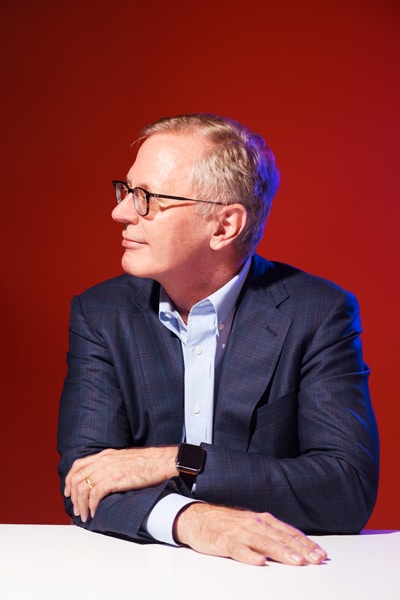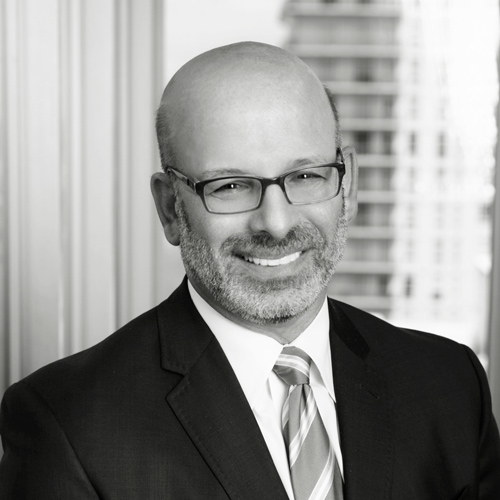
Many lawyers look at the time they spend working at a firm—often crisscrossing the country, dealing with the headache of billable hours while handling a dizzying array of clients—as a necessary experience before they move into a less stressful in-house role that they’ve always had their eyes on. They might stay at a firm three or four years, say, before making the jump.
Los Angeles lawyer Daniel Floyd, though, did it for thirty years before finally landing at Sony Pictures Entertainment as executive vice president of global litigation in 2016. He says he needed every one of those years to prepare to do the best job he could for the entertainment giant.
Floyd grew up in the San Fernando Valley and has never had cause to leave the Los Angeles area other than to go to law school at Berkeley. He spent all thirty years of his career before Sony in the same office building downtown. “Working at a top law firm is a difficult grind and a hard job,” he says. “I was traveling all over the country, taking depositions, writing briefs, and arguing cases. Some people love the work, and I did a lot, but I also found over time that what I really liked was problem-solving. I realized I had become better suited for a job as a counselor and a strategist. And I wanted a new chapter in my career.”
Just as these thoughts were becoming fully formed, a friend called him at work and told him Sony Pictures was looking to hire a new head of litigation. It was a serendipitous opportunity for the lifelong movie buff—Humphrey Bogart is his favorite actor, and he loves the films of that era—and he felt it was the right time to move into a new phase in his career. But, he still appreciates what he gained from the long time he spent at his old firm.
“I feel like the experience I had gained at the firm, working on all different types of matters, was invaluable,” he says. “It’s helped me tremendously in dealing with the myriad of issues that come up at a large entertainment company.”
Among the things he handles now for Sony are copyright and trademark issues, claims made against the company, claims Sony makes against others, some patent work, content distribution, and all the contractual relationships endemic in the entertainment industry.
Floyd’s internal team is small, with two experienced lawyers who report to him and a third coming on board. Because of the reliance Sony has on outside counsel, he has spent a lot of time systematizing the contracting and billing process, using ideas he gleaned over the course of his career.
“I practiced as a litigator for thirty years,” he says. “I was required to follow the lead of a lot of different companies, and I saw how they managed litigation and strategized. So, now I take what I learned, using the tools available, like billing and budgeting software, that help me be a focused, efficient problem solver.”
The software helps Floyd do everything from put the right team of counsel together to billing. It helps him predict and monitor, enforce requirements, and generally make sure things don’t veer in an unhelpful direction. “There are ways that people can submit budgets, and we can do comparisons,” he says. “You can see what people are spending their time on. We have certain expectations that need to be met, and we need to hold outside counsel accountable.”
In working with his team inside, Floyd says he tries to make every interaction face-to-face rather than relying on email and phone. He was legendary in his old firm (as well as at Sony) for walking the halls and knocking on people’s doors.
“At Gibson Dunn, Dan was widely admired as a great writer, remarkably smart but very practical,” says Floyd’s former partner, Scott Edelman. “He was the guy I called when I had a knotty legal problem that needed talking though—and the guy I called when I wanted a recommendation on a good book or movie. He has a voracious intellectual appetite, which he applies to all aspects of his life.”
“When you have a dialogue back and forth, you can read body language, tone of voice,” Floyd says, reflecting on his face-to-face approach. “If you’re emailing, everybody’s trying to be formal and guarded to make sure it’s clear. When you talk to somebody, you get to the heart of things more easily. You listen, and they listen. I’ve found that this is the best way to collaborate and come up with better strategies.”
As a leader, Floyd always tries to convey to his team members the passion he has for his work. “I am enthusiastic about what I do, and I try to infuse that in the people I’m working with,” he says. “Ultimately, I take responsibility, but I am always collaborating and keeping up with what’s going on with everybody. At the same time, they get the ability to exercise their own judgment and discretion. I try to give them the authority to make choices and do things, like I’ve always been able to do.”
Photo by Guerrero Media
Paying Learning Forward
Floyd grew up in Van Nuys in the San Fernando Valley, living with his mother, in what he describes as a lower-middle class existence. Having benefited from the public-school system and the programs it offered at the time, he has since decided to give back. Here’s a look at the children’s nonprofits he works for:
Heart of Los Angeles: Floyd serves on the board of the youth center, which provides education, tutoring, college prep, arts, and sports programs for an underserved area near downtown.
Constitutional Rights Foundation: Floyd also serves on the board of this organization, which promotes civic and legal education, including a mock trial program and a “cops and kids” program.
Expertise Spotlight
Gibson, Dunn & Crutcher LLP is a full-service global law firm with more than 1,300 lawyers in 20 offices worldwide. The firm and its lawyers are recognized for excellent legal service and represent clients in some of the most complex and high-profile transactions in the world.
An acknowledged leader in representing companies (including Sony) ranging from start-up ventures to multinational corporations—across a diverse range of industries from high technology to manufacturing—as well as financial institutions, other service companies, and government entities, Gibson Dunn consistently ranks among the top law firms in the world in published league tables. Acclaimed as a litigation powerhouse, the firm was named the 2016 Litigation Department of the Year by The American Lawyer, its unprecedented third win in the biennial competition since 2010. “Time and again,” noted the publication, “Gibson Dunn litigators set out to win big rather than just escape defeat, and they succeeded. . . . The firm repeatedly delivered when it mattered most.”
The firm’s corporate and real estate practices are also recognized for their involvement with some of the most significant transactions in the market. Its sustained success in delivering both first-rate legal work and exceptional responsiveness is built on its values of quality, integrity, collegiality, and mutual respect.


